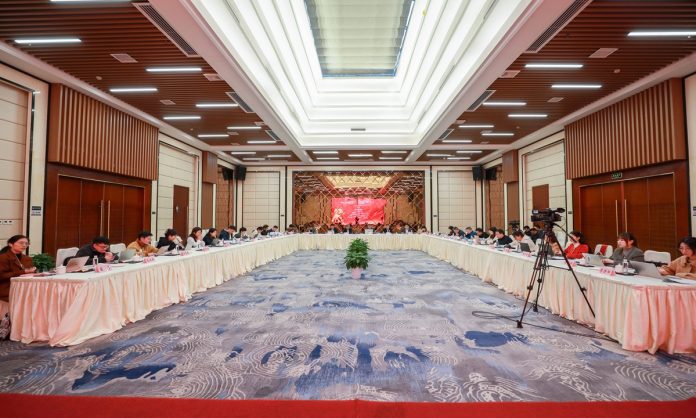BEIJING: A major seminar involving dozens of experts and scholars on democracy and human rights was held on Sunday in Central China, where a consensus was reached that Chinese-style democracy conforms to the national conditions, carries forward the national fine traditional culture, draws on the achievements of human civilization, and enriches and develops the diversity of human political civilization.
While expressing their anticipation for more such conferences to be held, scholars and experts stressed that China, unlike the US and some other Western countries, would not impose its own model of democracy and human rights on other countries, let alone use the so-called de-mocracy and human rights to suppress others.
During the seminar, which was hosted by Central South University under the guidance of the China Society for Human Rights Studies, He Zhipeng, a professor of international law from Ji-lin University, put forward three points of view that democracy is a mode of governance; de-mocracy is a human right; democracy is not a supreme value, and serving as a legal or political value, it must be considered together with other values.
Citing the words and deeds from the then Trump administration and the current Biden admin-istration in the US, He pointed out that Western democracy is a capital-led democracy with strong political party competition. Under such a democratic system, power is rotated and the political system and direction are unstable, He said.
All Chinese democratic institutions, arrangements and ideals are ultimately aimed at achieving the great rejuvenation of the Chinese nation. Our democracy is more about political consulta-tion under the leadership of the Party than taking turns in power, He noted.
However, the US-led Western camp has been taking its democracy as right and taking others’ as wrong, He told the Global Times. For a long period of time, the Western camp has been the exporter of world culture, that is, it believes that its culture as well as its democracy are the best, while others are barbaric. Alt-hough now the policymakers in the Western camp have realized defects in their own democra-cy, they are unwilling to admit it and still try to maintain an advantage in the discourse of competition and system competition with countries including China, He said.
Taking the example of the US-held “democracy summit,” He told the Global Times that the conference will be unilateralism in the name of multilateralism.
He criticized the US, which tries to use the so-called democracy summit to suppress dissidents, enhance its hegemony and confront the vast number of developing countries, including China.
He called for more such seminars and conferences with scholars and organizations from other countries and regions to be held in China to reach further consensus on the related topics at the larger international community level.
Chang Jian, a professor and director of the Center for the Study of Human Rights at Nankai University, who also attended the seminar and made a speech there, told the Global Times on Sunday that the form of democracy in practice should be chosen in light of the different histo-ry, culture and national conditions of each country, and the democratic model of other coun-tries should not be completely copied. Chang stressed that some Western countries such as the US should not undermine the trend of world democracy by homogenizing democracy and hu-man rights.
It is necessary to learn from others’ strengths and explore our own models of democracy and human rights, and only in this way can we achieve long-term development and make the peo-ple the masters of the country, Chang noted.
The democracy summit was supposed to involve the majority of countries across the world, but the US excluded many countries and only invited countries and regions in its own camp, trying to form cliques and contain and deny other countries’ democracy and human rights, which tar-nished the spirit of democracy, Chang said.
Chang shared his understanding of China’s whole-process people’s democracy, which consists of five processes – the political process, namely elections; the policy process, that is, conduct-ing surveys to ask people for their opinions; the process of social governance involving grass-roots democracy; enterprise democracy, and democracy in international relations. –The Daily Mail-Global Times news exchange item




